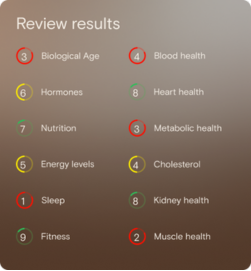What is Albumin?
Albumin is a major protein made by the liver that circulates in the blood. It maintains fluid balance within blood vessels and helps transport important molecules like hormones, vitamins, and minerals throughout the body.
Why does it matter for long-term health and wellbeing?
Albumin provides a snapshot of how well your body maintains internal balance. Measured through an albumin test in blood, stable levels support efficient nutrient delivery, detoxification, and tissue repair, contributing to energy, resilience, and healthy ageing.
What’s an optimal level of Albumin?
- Optimal range: 35–45 g/L
- Typical Australian lab reference range: 32–50 g/L
What influences Albumin levels?
Albumin can be influenced by nutrition, hydration, liver production, physical activity, and levels of inflammation in the body. Balanced protein intake, adequate hydration, and healthy lifestyle habits help maintain stable levels.
What does it mean if Albumin is outside the optimal range?
Levels below or above the optimal range can suggest shifts in hydration, nutrient status, or metabolic load. It’s a signal to assess your lifestyle factors, such as diet, rest, and hydration, and discuss any ongoing trends with a qualified health professional.
How can I support healthy Albumin levels?
Focus on a balanced diet rich in quality protein, stay well-hydrated, and prioritise rest and recovery. Regular tracking of albumin can help you notice changes early and adjust your nutrition or lifestyle to stay within your optimal range.
This information is provided for general health and wellness purposes only and does not replace medical advice.
References
- Royal College of Pathologists of Australasia. Albumin assessment.
- Pathology Tests Explained — Albumin (Australia)
- Choy K. W. et al. “Determination of adult reference intervals for serum albumin.” Pathology (RCPA)
- TGA – Australian Public Assessment Report: human Albumin (functions in plasma oncotic pressure and transport)




















.png)


.svg)

